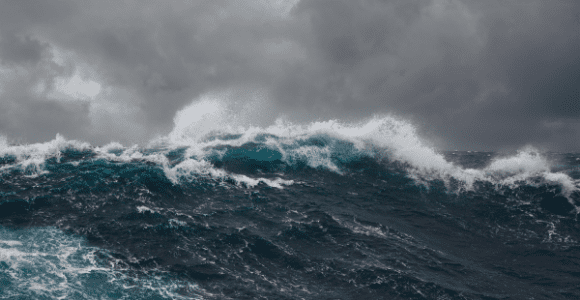Welcome readers! Please subscribe through the buttons on the right.

Our reading this week is from the gospel of Mark:
On that day, when evening had come, he said to them, “Let us go across to the other side.” And leaving the crowd behind, they took him with them in the boat, just as he was. Other boats were with him. A great windstorm arose, and the waves beat into the boat, so that the boat was already being swamped. But he was in the stern, asleep on the cushion; and they woke him up and said to him, “Teacher, do you not care that we are perishing?” He woke up and rebuked the wind, and said to the sea, “Peace! Be still!” Then the wind ceased, and there was a dead calm. He said to them, “Why are you afraid? Have you still no faith?” And they were filled with great awe and said to one another, “Who then is this, that even the wind and the sea obey him?” (Mark 4:35-41)
The story of Jesus calming the storm is the first nature miracle in the gospel of Mark. Until this point, the author of this gospel has been structuring narratives that subverted Jesus’ society. Jesus is an exorcist or healer in stories that subtly call into question the social power structures and who they benefited and marginalized.
But with this story, the author introduces a new side of Jesus. Now Jesus is also seen as having authority in relation to nature itself.
The first “sea” (lake) crossing in Mark’s gospel is part of a pattern in Mark of pairing important narratives. The second sea crossing is in Mark 6:45-53. The two feedings of the multitudes are another example.
Most scholars believe that the gospel of Mark was intended for both Jewish and non-Jewish Jesus followers. In the early church, making the Christian tent large enough to bring together both Jewish followers of Jesus (in Galilee and Judea) and Gentile followers of Jesus (from Paul’s travels and ministry) was a top priority. So in this first sea crossing, the author of Mark is invoking narratives that would have been meaningful to both groups of Jesus followers. By calling the lake “sea” this gospel recalls Hebrew narratives about Yahweh and the “sea,” such as the ark of Noah, the crossing of the Red Sea, and the reference to storms in the Psalms:
“By his power he stilled the Sea; by his understanding he struck down Rahab [mythical sea monster, symbol for Egypt].” (Job 26:12)
“He made the storm be still, and the waves of the sea were hushed. (Psalms 107.29)
“He rebuked the Red Sea, and it became dry; he led them through the deep as through a desert.” (Psalms 106:9)
For Hellenistic Jesus followers, Jesus’ ability to command the wind and the sea would have been one of the few acts in the gospel of Mark comparable to the stories of Hellenistic miracle workers. Having the ability to command wind and sea associated a person with the powers attributed to Zeus (wind) and Poseidon (sea).
There may be another apologetic association being made in this story as well. We’ll pursue this a bit further in Part 2.













